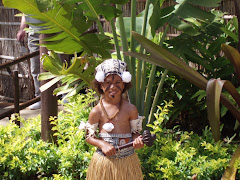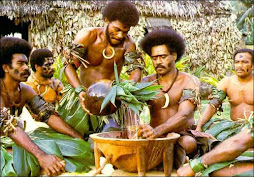Modern day Fijians are still looking at the signs that the land could be telling us something. Even modern day Christians forget the responsibility each human being has over the land and all creatures and fish as Jehovah had wished.
As we wrap up this series we have to ask ourselves whether the GCC was an offspring of the colonialists' attempts to bring their own sense of order to replace the already sophisticated social order that our ancestors had established for themselves.
In that way were they beginning a suppression of the Fijian race that would culminate in today where Fijians are struggling to take hold of their heritage.
If the GCC has served its purpose properly, why are some Fijians still not happy, in a silent way, to-day with how development has trudged slowly leaving the rural Fijian way behind compared to rich farmers of old. The Rewa Rugby Union of old is a classic example of our bone of contention in this issue.
Most of the players who represented the team were from other provinces and involved vanua sides who had more affinity to Tailevu than Rewa. As the new rugby era of the late 1990s led by a number of Tailevu chiefs, including the late Koya na Ratu Mai Verata (one of the prominent chiefs of the old matanitu), members of the Vunivalu of Bau clan and other senior chiefs of the province Tailevu, formerly known as Rewa, started to scoop major rugby titles. The Waimanu rugby players, who used to represent Rewa, joined with Tailevu ruggers but then returned to their original roots and the present day Naitasiri rugby side as a result of unification initiated by the Qaranivalu of Naitasiri, Ratu Inoke Takiveikata.
Then Northland Tailevu (from Verata to the Wainibuka area) split from the Southern Tailevu teams and today they are being blessed with decent crowds and promising futures from budding rugby players. For these dominions, returning to their origins has opened the floodgates that once were closed.
Recently a Fijian prayer group travelled to Canada to conduct a cleansing pro-cess with indigenous tribes who were facing problems similar to what we are highlighting. The group visited the Rankin Inlet and Pangnirtung, Nunavut communities in July last year. The original inhabitants had a legitimate claim to the land. Thus they believed in the special relationship that Fijians refer to as the vanua (the land, sea and surroundings are one with humans).
The Canadian reconciliation involved the old settlers reconciling with the present day inhabitants who had settled the land later. They dug holes where they wrote down their wishes and poured oil over the prayers and offered bread (the body of Christ) and wine (his blood) in a holy sacrament. Deeply inflicted wounds involving the immigrant chiefs and the old guard were being treated and reconciled. The miracle came when a wildlife manager at Rankin Inlet reported that close to 15,000 caribou (considered a delicacy for the indigenous) appeared at the site of the cleansing ceremony. In this case it had been missing for such a long time from their midst.
So what can we do to address this matter in our own time of need. Similarly to how the Canadians reconciled with the custodians of the land, Fiji needs its own reconciliation.
The old matanitu needs to meet the present day establishment so that the harmonious existence of old and new takes place and the people who are supposed to come under the domain of another chief can mix freely with their rightful allies and chiefs.
Much of the new is well versed in modern day politics and are needed to help pave the way forward. A spiritual element needs to take precedence and Christian churches need to pray for the chiefs the people and the land.
The old GCC needs to be restructured and refined to include the ways of old.
What was a "kaucake syndrome" needs to be replaced with a "kau sobu tale mai syndrome". But until we resolve those unsettled issues and what many term as a gross miscalculation of administrative justice Fijians will continue to wander in circles in the wilderness. Today may be the only time we can address this.
Subscribe to:
Post Comments (Atom)


No comments:
Post a Comment